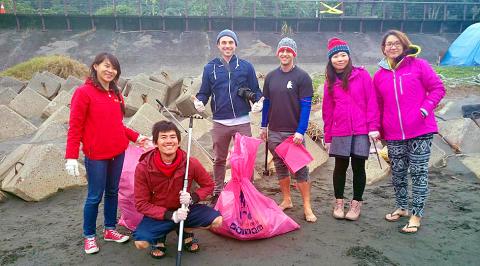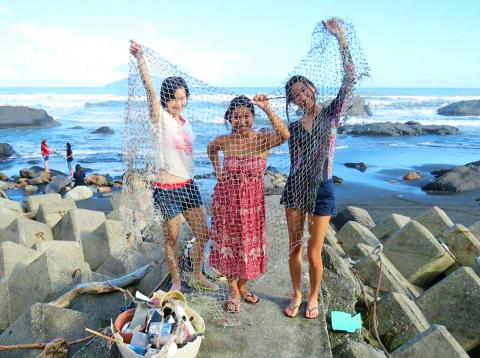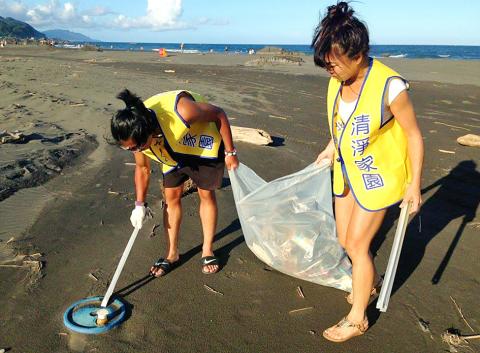Those who have been to Waiao Beach (外澳) in Yilan might have heard of Candy Lin (林靜如), or “Queen Candy” as she is known among the local surf community. Dressed in a sundress, or overalls, she’s usually putting up trash cans along the beach, cleaning up Waiao Train Station (外澳火車站) or leading groups of children on beach clean-ups.
On Saturday, along with the Chinese Taipei Surfing Association (CTSA), Lin will be hosting a beach clean-up at Double Lions Beach (雙獅) next to Waiao. The clean-up will be part of the CTSA’s annual National Springtime Surfing Championships held at Double Lions and contestants will also take part in the clean-up.
Lin, who is also co-founder of the Rising Sun Surf Inn, says that she’s happy to see more beach clean-ups taking place along Taiwan’s east coast but wants to stress the educational aspect of it.

Photo courtesy of Taiwan Open of Surfing
“It doesn’t work if we just go to the beach and pick up trash,” Lin tells the Taipei Times. “There needs to be a change in the way that people view their natural surroundings.”
In addition to clean-ups, Lin also organizes lectures at Waiao Community Center about environmental and ocean awareness and tries to make clean-ups fun by converting them into trash art competitions.
George Tsai (蔡濯羽) of the CTSA is happy to have Lin in charge of the clean-up activity for this year’s surf competition.

Photo courtesy of Rising Sun Surf Inn
“Candy has become sort of a legend in our community,” says Tsai, a surf instructor and owner of Super George Surf Shop.
He adds that’s it’s important for new surfers to be environmentalists as well, as learning how to surf normally comes hand in hand with learning how to respect nature.
CULTIVATING CIVIC CONSCIOUSNESS

Photo courtesy of Rising Sun Surf Inn
Lin was an unlikely person to be an environmental activist. Growing up between Taipei and Tainan, she hadn’t thought about surfing until she and her business partner, Garrett Ball, opened the Rising Sun Surf Inn in 2012.
“We barely had any guests in our first year,” Lin recalls. “So I walked around the beach and saw a lot of trash sitting around and thought that it shouldn’t be here.”
Waiao Train Station reminded Lin of the train station in a small village in Japan’s Chiba Prefecture where she used to live.

Photo courtesy of Rising Sun Surf Inn
“The old people in that village in Japan would clean up the train station every week so I wondered why we didn’t do that here.”
Lin started by cleaning the train station and beach and soon after, surfers and other people who lived nearby joined her. Together, they set up trash cans along the beach instructing beach-goers how to separate and dispose of their trash and had groups of schoolchildren paint the trash cans.
These days, instead of trash in Waiao, it’s common to see cabbage and other crops sitting out under the sun to dry. The crops belong to elderly residents who were initially hostile towards Lin and the surfers for encroaching into their neighborhood.
“They would get mad when I tried to explain to them why burning their trash on the beach was bad for the environment and their health,” Lin says.
Two summers ago, Typhoon Soudelor hit Waiao badly and their crops were destroyed. Lin and the surfers helped pick up the damaged crop and plant new vegetables. Upon seeing their efforts, the elderly people were grateful and haven’t burned trash on the beach since.
“Now, when I get back from a trip overseas, they’ll say, ‘Candy is back!’ and show me a part of the beach that they cleaned up,” Lin laughs.
She adds that it just takes time to cultivate civic consciousness and change people’s mindsets.
“We’ve seen it happen with the elderly residents and there’s no reason it can’t happen with everyone else who comes to the beach.”

June 2 to June 8 Taiwan’s woodcutters believe that if they see even one speck of red in their cooked rice, no matter how small, an accident is going to happen. Peng Chin-tian (彭錦田) swears that this has proven to be true at every stop during his decades-long career in the logging industry. Along with mining, timber harvesting was once considered the most dangerous profession in Taiwan. Not only were mishaps common during all stages of processing, it was difficult to transport the injured to get medical treatment. Many died during the arduous journey. Peng recounts some of his accidents in

“Why does Taiwan identity decline?”a group of researchers lead by University of Nevada political scientist Austin Wang (王宏恩) asked in a recent paper. After all, it is not difficult to explain the rise in Taiwanese identity after the early 1990s. But no model predicted its decline during the 2016-2018 period, they say. After testing various alternative explanations, Wang et al argue that the fall-off in Taiwanese identity during that period is related to voter hedging based on the performance of the Democratic Progressive Party (DPP). Since the DPP is perceived as the guardian of Taiwan identity, when it performs well,

A short walk beneath the dense Amazon canopy, the forest abruptly opens up. Fallen logs are rotting, the trees grow sparser and the temperature rises in places sunlight hits the ground. This is what 24 years of severe drought looks like in the world’s largest rainforest. But this patch of degraded forest, about the size of a soccer field, is a scientific experiment. Launched in 2000 by Brazilian and British scientists, Esecaflor — short for “Forest Drought Study Project” in Portuguese — set out to simulate a future in which the changing climate could deplete the Amazon of rainfall. It is

The Taiwan People’s Party (TPP) on May 18 held a rally in Taichung to mark the anniversary of President William Lai’s (賴清德) inauguration on May 20. The title of the rally could be loosely translated to “May 18 recall fraudulent goods” (518退貨ㄌㄨㄚˋ!). Unlike in English, where the terms are the same, “recall” (退貨) in this context refers to product recalls due to damaged, defective or fraudulent merchandise, not the political recalls (罷免) currently dominating the headlines. I attended the rally to determine if the impression was correct that the TPP under party Chairman Huang Kuo-Chang (黃國昌) had little of a